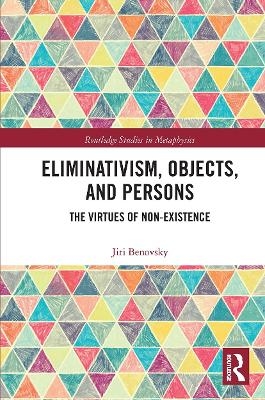
Eliminativism, Objects, and Persons
Routledge (Verlag)
978-0-367-73370-4 (ISBN)
In Eliminativism, Objects, and Persons, Jiri Benovsky defends the view that he doesn't exist. In this book, he also defends the view that this book itself doesn't exist. But this did not prevent him to write the book, and although in Benovsky's view you don't exist either, this does not prevent you to read it.
Benovsky defends a brand of non-exceptionalist eliminativism. Some eliminativists, typically focusing on ordinary material objects such as chairs and hammers, make exceptions, for instance for blue whales (that is, living beings) or for persons (that is, conscious organisms). Benovsky takes one by one all types of allegedly existing objects like chairs, whales, and persons and shows that from the metaphysical point of view they are more trouble than they are worth—we are much better off without them. He thus defends an eliminativist view about ordinary objects as well as the 'no-Self' view, where he explores connections between metaphysics, phenomenology, and Buddhist thought. He then also considers the case of aesthetic objects, focusing on musical works and photographs, and shows that the claim of their non-existence solves the many problems that arise when one tries to find an appropriate ontological category for them, and that such an eliminativist view is more natural than what we might have thought. The arguments provided here are always topic-specific: each type of entity is given its own type of treatment, thus proving a varied and solid foundation for a generalized, non-exceptionalist, full-blown eliminativist worldview.
Having been struck by Descartes' evil demon thought-experiment, Jiri Benovsky began to study metaphysics to try to find a proof that the world really exists. He did not find that proof, but at least he found a job at the University of Fribourg, Switzerland, where he can not only go in the mountains but also spend his days thinking about things like existence, reality, personal identity, possible worlds, material objects, and time. He is the author of several books, mainly in the fields of metaphysics and aesthetics, including Meta-metaphysics: On metaphysical equivalence, primitiveness, and theory choice (2016) and Persistence through time, and across possible worlds (2006).
Introduction: Eliminativism: A Method
Part I: Eliminativism
1. Eliminativism and Ordinary Objects
2. Eliminativism, Common Sense, and Intuitions
3. Eliminativism, Reductionism, and Composition
4. The Fundamental Ontology of Eliminativism
Part II: The no-Self View
5. Exceptionalism
6. The Self: A Substance or a Bundle?
7. The no-Self View
8. Eliminativism, Life, and Death
Part III: Aesthetic (and Other) Objects
9. 'Upper Level' Objects, Musical Works
10. Photographs
Concluding Remarks on Eliminativism and Monism
| Erscheinungsdatum | 16.01.2021 |
|---|---|
| Reihe/Serie | Routledge Studies in Metaphysics |
| Verlagsort | London |
| Sprache | englisch |
| Maße | 152 x 229 mm |
| Gewicht | 349 g |
| Themenwelt | Geisteswissenschaften ► Philosophie ► Geschichte der Philosophie |
| Geisteswissenschaften ► Philosophie ► Metaphysik / Ontologie | |
| Geisteswissenschaften ► Philosophie ► Philosophie der Neuzeit | |
| ISBN-10 | 0-367-73370-6 / 0367733706 |
| ISBN-13 | 978-0-367-73370-4 / 9780367733704 |
| Zustand | Neuware |
| Haben Sie eine Frage zum Produkt? |
aus dem Bereich


